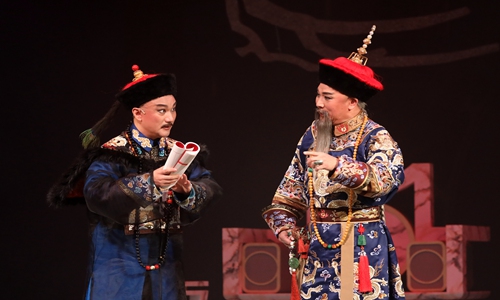ARTS / MUSIC
‘Fan clubs’ carry on Peking Opera traditions in Taipei

Actors rehearse Peking Opera Dream of the Red Chamber: Qianlong and Heshen in Taipei on December 5, 2019. Photo: CNSphoto
The 30-square-meter room on the first floor of a residential building in Taipei looks like an old tea house but has its curtains down and door shut even on a weekday afternoon.The clients in the room are old, some of whom are in their 90s, and their entertainment is centuries older. The tunes played by string instruments and drums and the slow singing, mixed with shouts of "Bravo" and applause, are carefully kept inside in order not to disturb neighbors.
Xiangyan, meaning "the feast of sound" in Chinese, is the only Peking Opera fan club that opens daily in Taipei. It has been a long tradition since the prime time of Peking Opera that fans not only watch actors play in theaters but also perform themselves, sometimes in full costume and stage makeup and sometimes just in plain clothes. Fan clubs, or piaofang in Chinese, are where they rehearse, perform and socialize.
"In the 1950s and 60s, we had about 200 fan clubs in Taipei. Peking Opera was a decent entertainment for people of taste," said Lee Yi-ching, a loyal fan and renowned amateur actor of Peking Opera in Taipei.
The 93-year-old former serviceman is specialized in a character type of Peking Opera that few play now, nandan (men playing female roles).
"I started to learn Peking Opera at the age of 11 and since then Peking Opera has become my life-long calling," Lee said.
Having left the mainland for Taiwan in 1949, Lee carried on the hobby and in his early 30s even went on stage with a local Peking Opera troupe for several years.
"It is because of Peking Opera that I can be so healthy at this age," he said.
Lee was not the oldest member of Xiangyan.
"The oldest is 104 years old. A majority of the members are over 80," said Hsu Chun-chiu, the host of the fan club. "In 2004 when the fan club was first founded, there were about 120 members and now around 60. The number kept reducing as the elderly passed away."
As far as Hsu knew, the number of Peking Opera fan clubs in Taipei that regularly meet once a week has been less than 20.
In Xiangyan's peak time, one afternoon the club received 66 members and 36 of them performed, Hsu recalled. "Now it will be a busy day when a dozen show up."
"Fewer and fewer young people understand Peking Opera. It is too complicated and takes longer time for them to learn, let alone become fans," said Hsu in her late 60s.
Another reason was fewer resources from Taiwan's cultural departments to promote Peking Opera, compared with those going to traditional operas sung in the Minnan dialect, Lee said.
Tense cross-Strait relations have also affected this club.
"I do not go to Xiangyan as often as I did three years ago. It is not because I am too old to sing but the club does not always have good musicians of jinghu (a two-stringed fiddle used in Peking Opera). A good band, led by the jinghu player, would notably improve amateur performances," Lee said.
"When the cross-Strait relations were warmer, many mainland jinghu masters would visit our club but now few come. It is very sad."
Despite the humble conditions and the cost, Xiangyan still has its loyals.
"This is where we meet our fellows and carry on our love of Peking Opera," Hsu said.

